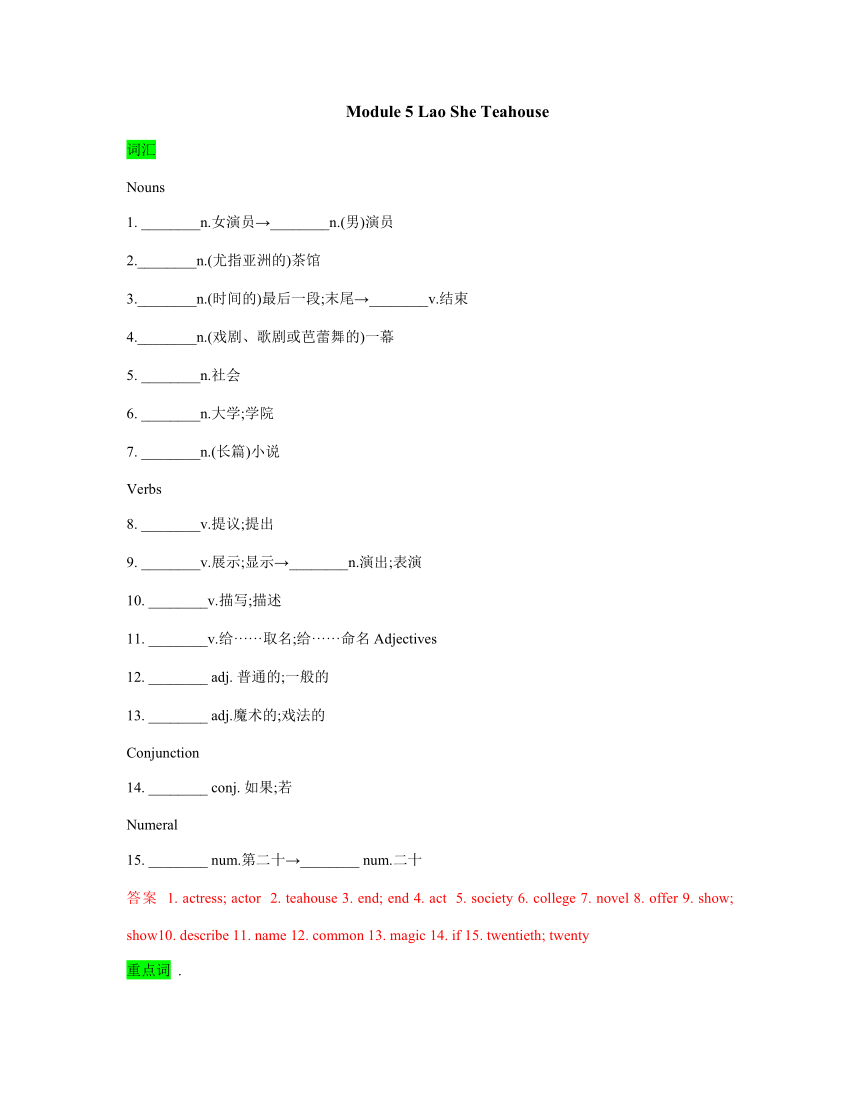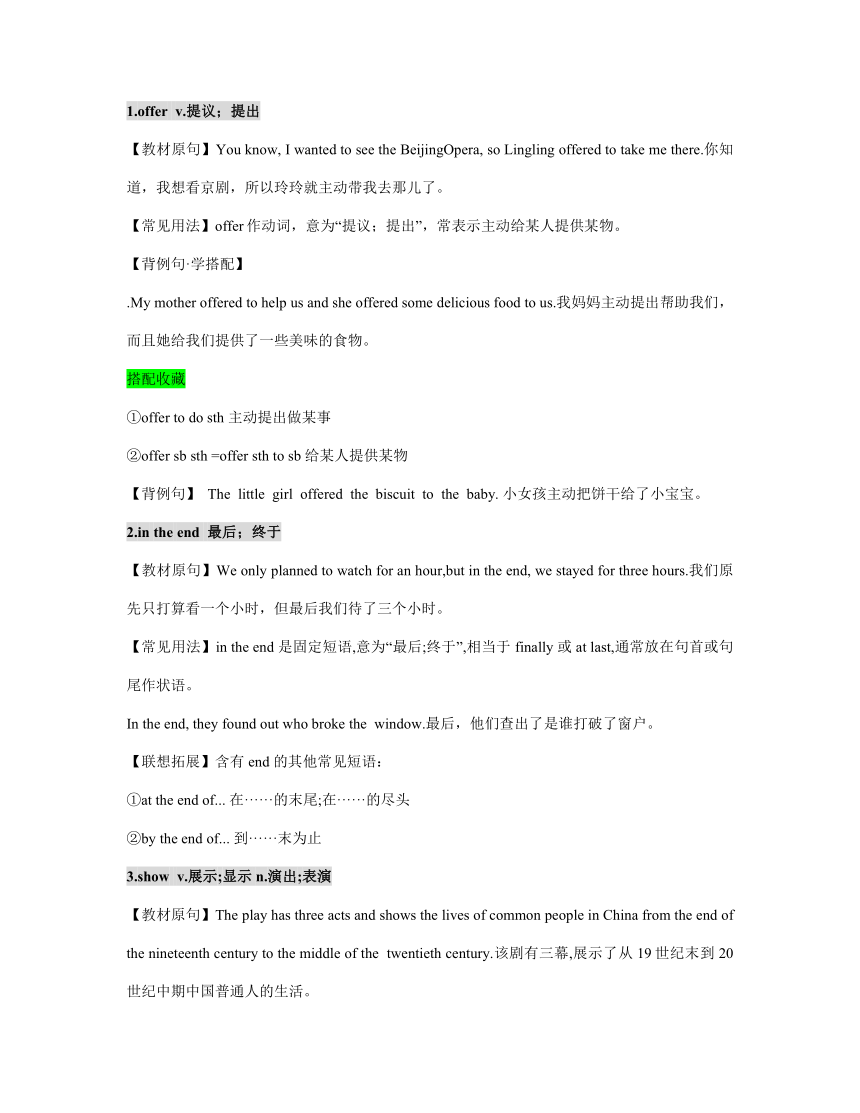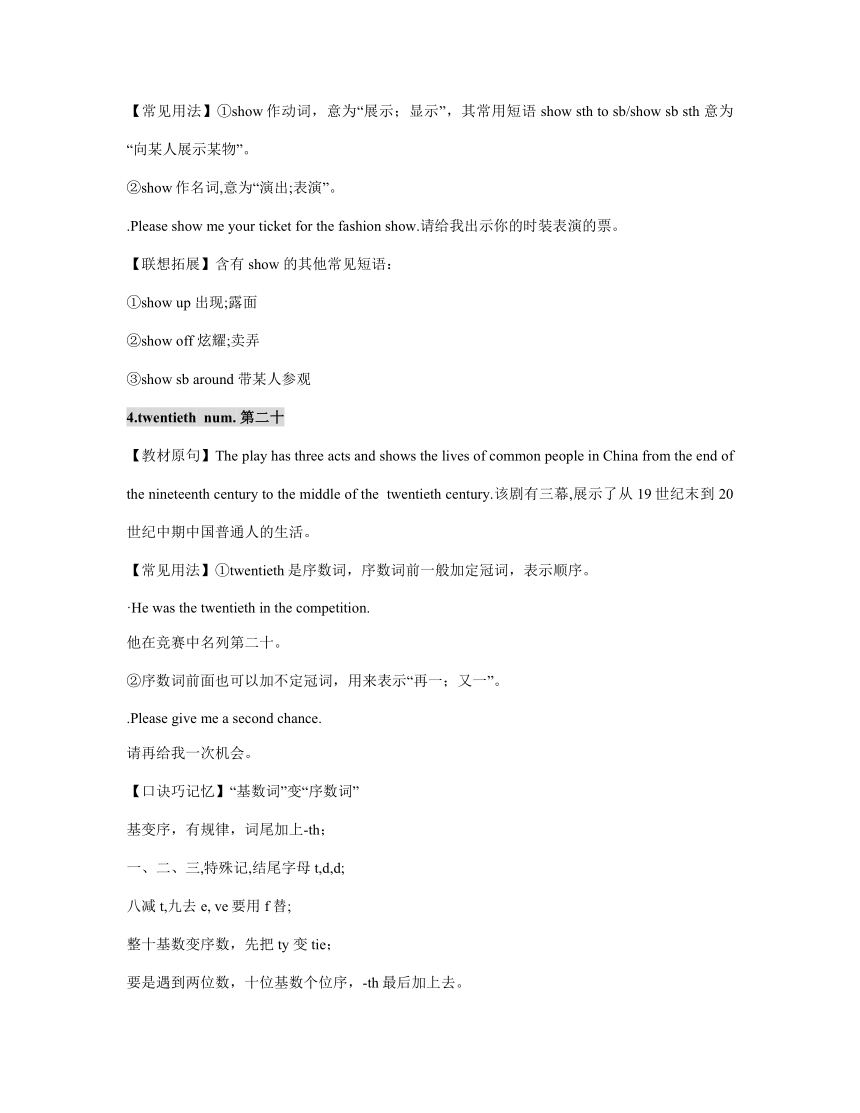Module 5 Lao She Teahouse. 重点知识讲解+被动语态+动词不定式作宾语(含解析)2023-2024学年外研版英语八年级上册
文档属性
| 名称 | Module 5 Lao She Teahouse. 重点知识讲解+被动语态+动词不定式作宾语(含解析)2023-2024学年外研版英语八年级上册 |

|
|
| 格式 | docx | ||
| 文件大小 | 24.2KB | ||
| 资源类型 | 教案 | ||
| 版本资源 | 外研版 | ||
| 科目 | 英语 | ||
| 更新时间 | 2024-07-05 18:49:50 | ||
图片预览



文档简介
Module 5 Lao She Teahouse
词汇
Nouns
1. ________n.女演员→________n.(男)演员
2.________n.(尤指亚洲的)茶馆
3.________n.(时间的)最后一段;末尾→________v.结束
4.________n.(戏剧、歌剧或芭蕾舞的)一幕
5. ________n.社会
6. ________n.大学;学院
7. ________n.(长篇)小说
Verbs
8. ________v.提议;提出
9. ________v.展示;显示→________n.演出;表演
10. ________v.描写;描述
11. ________v.给······取名;给······命名Adjectives
12. ________ adj. 普通的;一般的
13. ________ adj.魔术的;戏法的
Conjunction
14. ________ conj. 如果;若
Numeral
15. ________ num.第二十→________ num.二十
答案 1. actress; actor 2. teahouse 3. end; end 4. act 5. society 6. college 7. novel 8. offer 9. show; show10. describe 11. name 12. common 13. magic 14. if 15. twentieth; twenty
重点词 .
1.offer v.提议;提出
【教材原句】You know, I wanted to see the BeijingOpera, so Lingling offered to take me there.你知道,我想看京剧,所以玲玲就主动带我去那儿了。
【常见用法】offer作动词,意为“提议;提出”,常表示主动给某人提供某物。
【背例句·学搭配】
.My mother offered to help us and she offered some delicious food to us.我妈妈主动提出帮助我们,而且她给我们提供了一些美味的食物。
搭配收藏
①offer to do sth 主动提出做某事
②offer sb sth =offer sth to sb 给某人提供某物
【背例句】 The little girl offered the biscuit to the baby. 小女孩主动把饼干给了小宝宝。
2.in the end 最后;终于
【教材原句】We only planned to watch for an hour,but in the end, we stayed for three hours.我们原先只打算看一个小时,但最后我们待了三个小时。
【常见用法】in the end 是固定短语,意为“最后;终于”,相当于 finally 或 at last,通常放在句首或句尾作状语。
In the end, they found out who broke the window.最后,他们查出了是谁打破了窗户。
【联想拓展】含有end 的其他常见短语:
①at the end of... 在······的末尾;在······的尽头
②by the end of... 到······末为止
3.show v.展示;显示 n.演出;表演
【教材原句】The play has three acts and shows the lives of common people in China from the end of the nineteenth century to the middle of the twentieth century.该剧有三幕,展示了从19世纪末到20 世纪中期中国普通人的生活。
【常见用法】①show作动词,意为“展示;显示”,其常用短语 show sth to sb/show sb sth 意为“向某人展示某物”。
②show作名词,意为“演出;表演”。
.Please show me your ticket for the fashion show.请给我出示你的时装表演的票。
【联想拓展】含有 show 的其他常见短语:
①show up 出现;露面
②show off 炫耀;卖弄
③show sb around 带某人参观
4.twentieth num. 第二十
【教材原句】The play has three acts and shows the lives of common people in China from the end of the nineteenth century to the middle of the twentieth century.该剧有三幕,展示了从19世纪末到20 世纪中期中国普通人的生活。
【常见用法】①twentieth是序数词,序数词前一般加定冠词,表示顺序。
·He was the twentieth in the competition.
他在竞赛中名列第二十。
②序数词前面也可以加不定冠词,用来表示“再一;又一”。
.Please give me a second chance.
请再给我一次机会。
【口诀巧记忆】“基数词”变“序数词”
基变序,有规律,词尾加上-th;
一、二、三,特殊记,结尾字母t,d,d;
八减t,九去e, ve要用f替;
整十基数变序数,先把ty 变 tie;
要是遇到两位数,十位基数个位序,-th最后加上去。
典例—How old is your son
—________. We had a special party for his________ birthday yesterday.
A. Nine;nine B. Ninth;nine
C. Nine;the ninth D. Nine;ninth
【解析】句意为:——你儿子多大了 ——9 岁。昨天我们为他的九岁生日举办了一场特别的聚会。回答多大年龄的时候应用基数词;表示“ 岁生日”时要用序数词;当序数词前有形容词性物主代词等限定词时,不用再加定冠词the。
【答案】D
5.if conj. 如果;若
【教材 原句】If you like the Beijing Opera,traditional music or magic shows, you can enjoy them at the teahouse. 如果你喜欢京剧、传统音乐或魔术表演,你可以在茶馆里欣赏到它们。
【常见用法】if作连词,意为“如果;若”,常用来引导条件状语从句。当主句时态为一般将来时、主句中含有情态动词或者主句是祈使句时,从句用一般现在时表示将来。
·If you drive too fast, you may have an accident.
如果你开车开得太快,你可能会发生事故。
·We won't go for a walk if it snows tomorrow.如果明天下雪,我们将不出去散步。
句式 SENTENCES
被动语态
【教材原句】He wrote many plays, novels and shortstories about people's lives, and was named “the People's Artist".他写了许多关于人们生活的戏剧、小说和短篇故事,被誉为“人民艺术家”。
【句式结构】被动语态由“助动词be +及物动词的过去分词”构成,助动词be有时态、人称和数的变化。被动语态的时态变化通常是通过助动词be变化时态表现出来的,及物动词的过去分词不变。
·This book was written by him.这本书是他写的。
【联想拓展】句子的主动语态变为被动语态的步骤:
①把原句中的宾语变为主语;
②谓语部分变为“助动词be +及物动词的过去分词”。
典例 As the most exciting andtraditional way to shop, street markets ________here and there in China these days.
A. find B. found C. are found D. were found
【解析】句意为:作为最让人兴奋和传统的购物方式,如今在中国到处都能找到街市。根据these days 可知用一般现在时;主语street markets 和动词 find 之间是被动关系,用一般现在时的被动语态 are found。
【答案】C
语法 GRAMMAR
一、动词不定式作宾语
【教材原句】①We only planned to watch for anhour…我们原先只打算看一个小时……
②I hope to understand more next time.
我希望下次能懂得多一些。
③I wanted to take Betty to the teahouse becauseit's famous.我想带贝蒂去那家茶馆,因为它很有名。
choose, happen, hope, fail, wish, refuse, expect, plan, intend, pretend, offer, afford, demand 和 arrange等及物动词后面常接动词不定式作宾语。
·What did they decide to do 他们决定干什么
【口诀巧记忆】接不定式作宾语的动词口诀
动词不定作宾语,期(expect)希(hope;wish)渴欲承担起(afford);
愿望碰巧(happen) 又出现,假装( pretend) 安排(arrange)不拒绝(refuse);
准备计划(plan) 却失败(fail),好像提供(offer) 又犹豫;
企图(intend)要把目标证,爱恨要求(demand)做选择(choose)。
典例They hope ________ the
basketball match.
A. win B. won C. to win D. winning
【解析】句意为:他们希望赢这场篮球比赛。hope todo sth 意为“希望做某事”,此处应用动词不定式作宾语。
【答案】C
二、双宾语
【教材原句】It tells us the story of Wang Lifa and thecustomers of his teahouse in Beijing.它给我们讲述了王利发和他的北京茶馆里的顾客们的故事。
双宾语是指某些动词后面接两个宾语,结构是:主语+及物动词+间接宾语(人)+直接宾语(物)。常跟双宾语的动词有 give, show, pass, bring,lend, tell, teach, buy等。如果把直接宾语置于间接宾语之前,必须在转换时加介词to 或 for。
·He gave me a book. =He gave a book to me.他给了我一本书。
Note:当直接宾语是代词时,只能用“及物动词+sth +for/to +sb”结构。
·This is the last cake. I don't want to give it tohim.这是最后一块蛋糕。我不想把它给他。
词汇
Nouns
1. ________n.女演员→________n.(男)演员
2.________n.(尤指亚洲的)茶馆
3.________n.(时间的)最后一段;末尾→________v.结束
4.________n.(戏剧、歌剧或芭蕾舞的)一幕
5. ________n.社会
6. ________n.大学;学院
7. ________n.(长篇)小说
Verbs
8. ________v.提议;提出
9. ________v.展示;显示→________n.演出;表演
10. ________v.描写;描述
11. ________v.给······取名;给······命名Adjectives
12. ________ adj. 普通的;一般的
13. ________ adj.魔术的;戏法的
Conjunction
14. ________ conj. 如果;若
Numeral
15. ________ num.第二十→________ num.二十
答案 1. actress; actor 2. teahouse 3. end; end 4. act 5. society 6. college 7. novel 8. offer 9. show; show10. describe 11. name 12. common 13. magic 14. if 15. twentieth; twenty
重点词 .
1.offer v.提议;提出
【教材原句】You know, I wanted to see the BeijingOpera, so Lingling offered to take me there.你知道,我想看京剧,所以玲玲就主动带我去那儿了。
【常见用法】offer作动词,意为“提议;提出”,常表示主动给某人提供某物。
【背例句·学搭配】
.My mother offered to help us and she offered some delicious food to us.我妈妈主动提出帮助我们,而且她给我们提供了一些美味的食物。
搭配收藏
①offer to do sth 主动提出做某事
②offer sb sth =offer sth to sb 给某人提供某物
【背例句】 The little girl offered the biscuit to the baby. 小女孩主动把饼干给了小宝宝。
2.in the end 最后;终于
【教材原句】We only planned to watch for an hour,but in the end, we stayed for three hours.我们原先只打算看一个小时,但最后我们待了三个小时。
【常见用法】in the end 是固定短语,意为“最后;终于”,相当于 finally 或 at last,通常放在句首或句尾作状语。
In the end, they found out who broke the window.最后,他们查出了是谁打破了窗户。
【联想拓展】含有end 的其他常见短语:
①at the end of... 在······的末尾;在······的尽头
②by the end of... 到······末为止
3.show v.展示;显示 n.演出;表演
【教材原句】The play has three acts and shows the lives of common people in China from the end of the nineteenth century to the middle of the twentieth century.该剧有三幕,展示了从19世纪末到20 世纪中期中国普通人的生活。
【常见用法】①show作动词,意为“展示;显示”,其常用短语 show sth to sb/show sb sth 意为“向某人展示某物”。
②show作名词,意为“演出;表演”。
.Please show me your ticket for the fashion show.请给我出示你的时装表演的票。
【联想拓展】含有 show 的其他常见短语:
①show up 出现;露面
②show off 炫耀;卖弄
③show sb around 带某人参观
4.twentieth num. 第二十
【教材原句】The play has three acts and shows the lives of common people in China from the end of the nineteenth century to the middle of the twentieth century.该剧有三幕,展示了从19世纪末到20 世纪中期中国普通人的生活。
【常见用法】①twentieth是序数词,序数词前一般加定冠词,表示顺序。
·He was the twentieth in the competition.
他在竞赛中名列第二十。
②序数词前面也可以加不定冠词,用来表示“再一;又一”。
.Please give me a second chance.
请再给我一次机会。
【口诀巧记忆】“基数词”变“序数词”
基变序,有规律,词尾加上-th;
一、二、三,特殊记,结尾字母t,d,d;
八减t,九去e, ve要用f替;
整十基数变序数,先把ty 变 tie;
要是遇到两位数,十位基数个位序,-th最后加上去。
典例—How old is your son
—________. We had a special party for his________ birthday yesterday.
A. Nine;nine B. Ninth;nine
C. Nine;the ninth D. Nine;ninth
【解析】句意为:——你儿子多大了 ——9 岁。昨天我们为他的九岁生日举办了一场特别的聚会。回答多大年龄的时候应用基数词;表示“ 岁生日”时要用序数词;当序数词前有形容词性物主代词等限定词时,不用再加定冠词the。
【答案】D
5.if conj. 如果;若
【教材 原句】If you like the Beijing Opera,traditional music or magic shows, you can enjoy them at the teahouse. 如果你喜欢京剧、传统音乐或魔术表演,你可以在茶馆里欣赏到它们。
【常见用法】if作连词,意为“如果;若”,常用来引导条件状语从句。当主句时态为一般将来时、主句中含有情态动词或者主句是祈使句时,从句用一般现在时表示将来。
·If you drive too fast, you may have an accident.
如果你开车开得太快,你可能会发生事故。
·We won't go for a walk if it snows tomorrow.如果明天下雪,我们将不出去散步。
句式 SENTENCES
被动语态
【教材原句】He wrote many plays, novels and shortstories about people's lives, and was named “the People's Artist".他写了许多关于人们生活的戏剧、小说和短篇故事,被誉为“人民艺术家”。
【句式结构】被动语态由“助动词be +及物动词的过去分词”构成,助动词be有时态、人称和数的变化。被动语态的时态变化通常是通过助动词be变化时态表现出来的,及物动词的过去分词不变。
·This book was written by him.这本书是他写的。
【联想拓展】句子的主动语态变为被动语态的步骤:
①把原句中的宾语变为主语;
②谓语部分变为“助动词be +及物动词的过去分词”。
典例 As the most exciting andtraditional way to shop, street markets ________here and there in China these days.
A. find B. found C. are found D. were found
【解析】句意为:作为最让人兴奋和传统的购物方式,如今在中国到处都能找到街市。根据these days 可知用一般现在时;主语street markets 和动词 find 之间是被动关系,用一般现在时的被动语态 are found。
【答案】C
语法 GRAMMAR
一、动词不定式作宾语
【教材原句】①We only planned to watch for anhour…我们原先只打算看一个小时……
②I hope to understand more next time.
我希望下次能懂得多一些。
③I wanted to take Betty to the teahouse becauseit's famous.我想带贝蒂去那家茶馆,因为它很有名。
choose, happen, hope, fail, wish, refuse, expect, plan, intend, pretend, offer, afford, demand 和 arrange等及物动词后面常接动词不定式作宾语。
·What did they decide to do 他们决定干什么
【口诀巧记忆】接不定式作宾语的动词口诀
动词不定作宾语,期(expect)希(hope;wish)渴欲承担起(afford);
愿望碰巧(happen) 又出现,假装( pretend) 安排(arrange)不拒绝(refuse);
准备计划(plan) 却失败(fail),好像提供(offer) 又犹豫;
企图(intend)要把目标证,爱恨要求(demand)做选择(choose)。
典例They hope ________ the
basketball match.
A. win B. won C. to win D. winning
【解析】句意为:他们希望赢这场篮球比赛。hope todo sth 意为“希望做某事”,此处应用动词不定式作宾语。
【答案】C
二、双宾语
【教材原句】It tells us the story of Wang Lifa and thecustomers of his teahouse in Beijing.它给我们讲述了王利发和他的北京茶馆里的顾客们的故事。
双宾语是指某些动词后面接两个宾语,结构是:主语+及物动词+间接宾语(人)+直接宾语(物)。常跟双宾语的动词有 give, show, pass, bring,lend, tell, teach, buy等。如果把直接宾语置于间接宾语之前,必须在转换时加介词to 或 for。
·He gave me a book. =He gave a book to me.他给了我一本书。
Note:当直接宾语是代词时,只能用“及物动词+sth +for/to +sb”结构。
·This is the last cake. I don't want to give it tohim.这是最后一块蛋糕。我不想把它给他。
同课章节目录
- Module 1 How to learn English
- Unit 1 Let's try to speak English as much as possi
- Unit 2 You should smile at her.
- Unit 3 Language in use .
- Module 2 My home town and my country
- Unit 1 It's taller than many other buildings.
- Unit 2 Cambridge is a beautiful city in the east o
- Unit 3 Language in use .
- Module 3 Sports.
- Unit 1 Nothing is more exciting than playing tenni
- Unit 2 This year we training more carefully.
- Unit 3 Language in use .
- Module 4 Planes, ships and trains .
- Unit 1 He lives the farthest from school.
- Unit 2 What is the best way to travel.
- Unit 3 Language in use .
- Module 5 Lao She Teahouse.
- Unit 1 I wanted to see the Beijing Opera.
- Unit 2 It descibes the changes in Chinese society.
- Unit 3 Language in use .
- Module 6 Animals in danger.
- Unit 1 It allows people to get closer to them .
- Unit 2 The WWF is working hard to save them all.
- Unit 3 Language in use .
- Revision module A
- Module 7 A famous story
- Unit 1 Alice was sitting with her sister by the ri
- Unit 2 She was thinking about her cat.
- Unit 3 Language in use .
- Module 8 Accidents
- Unit 1 While the car were changing to red, a car s
- Unit 2 I was trying to pick it up when it bite me
- Unit 3 Language in use .
- Module 9 Population
- Unit 1 The population of China is about 1.37 billi
- Unit 2 Arnwick was a city with 200,000 people.
- Unit 3 Language in use .
- Module 10 The weathe
- Unit 1 It might snow.
- Unit 2 The weather is fine all year round.
- Unit 3 Language in use .
- Module 11 Way of life
- Unit 1 In China ,we open a gift later.
- Unit 2 In England, you usually drink tea with milk
- Unit 3 Language in use .
- Module 12 Help
- Unit 1 What should we do before help arrives?
- Unit 2 Stay away from windows and heavy furniture.
- Unit 3 Language in use .
- Revision module B
